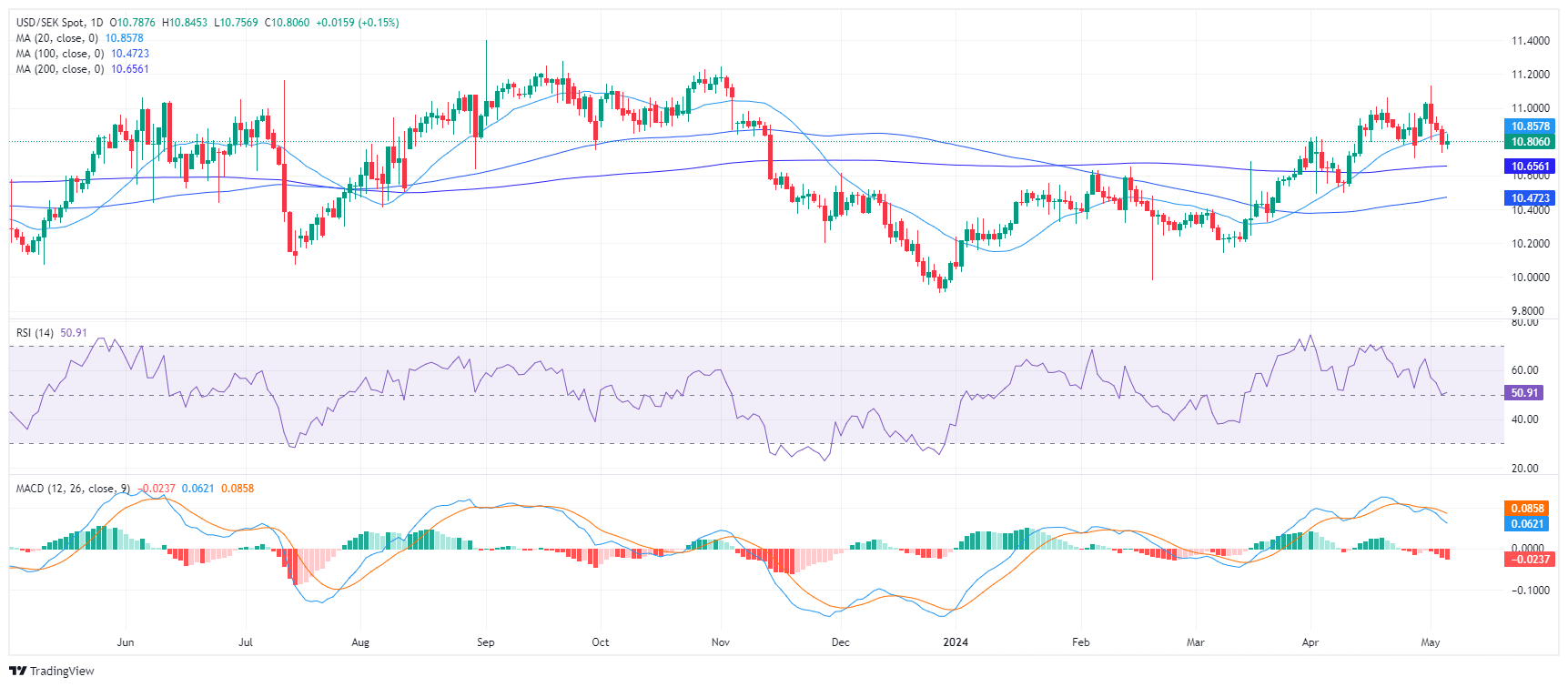- Analytics
- News and Tools
- Market News
- USD/SEK rises after weak Swedish data
USD/SEK rises after weak Swedish data
- The USD/SEK pair commences the week with mild gains around 10.80.
- Ahead of the Riksbank decision on Wednesday weak Swedish data pressures down the SEK.
- Markets adjusted their bets on the Fed after the soft NFP report from the US on Friday.
The USD/SEK pair is currently trading with mild gains to begin the week. Despite the optimism from the Federal Reserve's (Fed) projected robust Q2 growth, there are concerns that softer data might impact the USD negatively which may trigger another adjustment of the market's bets on the easing cycle. On the SEK’s side, soft PMIs seem to be applying downward pressure.
On the data front, Sweden's April services and composite PMIs disappointed, with services registering at 48.1 compared to an anticipated 53.8, and a revised figure of 54.1. This decline contributed to a composite PMI of 49.0, down from a revised 53.0 and marked the lowest level since November. As for now, markets anticipate only a 60% chance of a cut this Wednesday from the Riksbank, although a cut becomes fully priced in for June 27.
On the USD side, following the weak job report released on Friday, the likelihood of a July rate cut has surged to 40% from the previous 25%, and the probability of a rate cut in September is near to be price in, after standing at around 55%. The Greenback’s dynamic will be set by the incoming data as Jerome Powell stated that the bank remains data dependent. With no highlights this week, the pair pace will likely be set by the Riksbank’s tone and the market's response to it.
USD/SEK technical analysis
On the daily chart, the Relative Strength Index (RSI) of the USD/SEK pair reveals a transition towards a negative trend falling towards 50. Complementing the RSI effects, the Moving Average Convergence Divergence (MACD) histogram is rising yet printing red bars. This brings to light an increasing negative momentum in the market and a shift of momentum which might start favoring the sellers.
USD/SEK daily chart

© 2000-2026. All rights reserved.
This site is managed by Teletrade D.J. LLC 2351 LLC 2022 (Euro House, Richmond Hill Road, Kingstown, VC0100, St. Vincent and the Grenadines).
The information on this website is for informational purposes only and does not constitute any investment advice.
The company does not serve or provide services to customers who are residents of the US, Canada, Iran, The Democratic People's Republic of Korea, Yemen and FATF blacklisted countries.
Making transactions on financial markets with marginal financial instruments opens up wide possibilities and allows investors who are willing to take risks to earn high profits, carrying a potentially high risk of losses at the same time. Therefore you should responsibly approach the issue of choosing the appropriate investment strategy, taking the available resources into account, before starting trading.
Use of the information: full or partial use of materials from this website must always be referenced to TeleTrade as the source of information. Use of the materials on the Internet must be accompanied by a hyperlink to teletrade.org. Automatic import of materials and information from this website is prohibited.
Please contact our PR department if you have any questions or need assistance at pr@teletrade.global.















